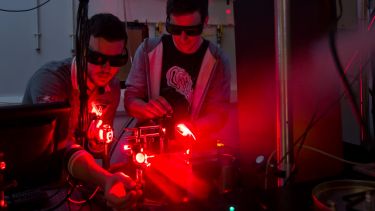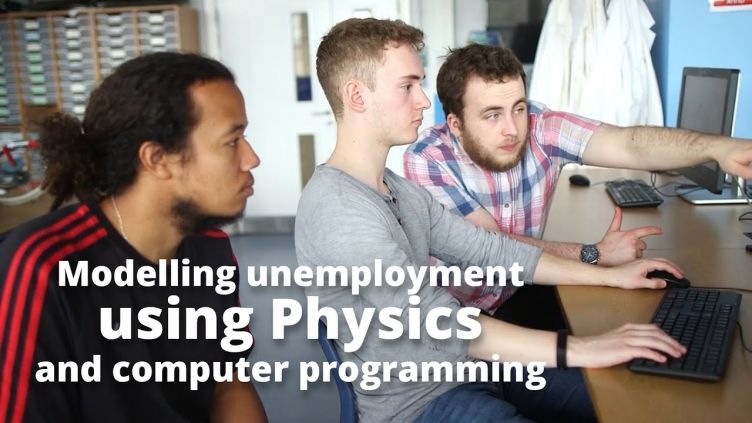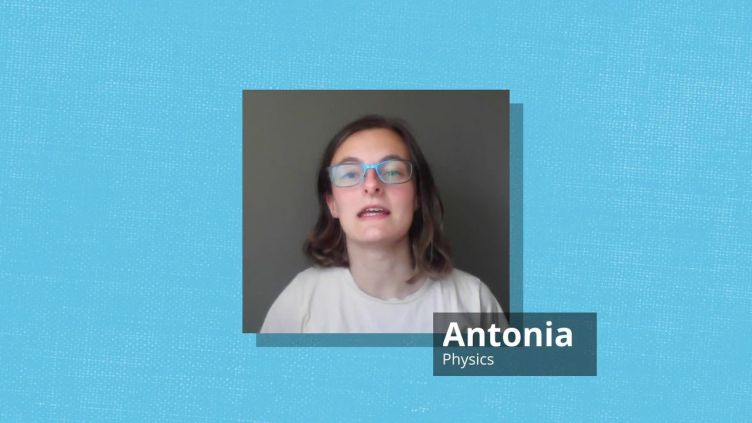Physics with a Foundation Year BSc MPhys
2025-26 entryExplore the fundamental laws of the universe and learn about the development of pioneering technologies in the School of Mathematical and Physical Sciences.
Key details
- A Levels BBB
Other entry requirements - UCAS code F309
- 5 years / Full-time
- September start
- Find out the course fee
- FY Foundation year
Explore this course:
Course description
Why study this course?
100% of our research and impact was rated world-leading or internationally excellent by REF 2021.
You’ll study in our newly refurbished teaching laboratories, and access loads of specialist technologies – including two telescopes on the roof of our building which you’ll be trained to use from your first year.
Physics students can access incredible research projects, including a summer research placement, work placements and field trips thanks to our links with organisations like CERN and the observatories on La Palma in the Canary Islands.
Our courses meet the educational requirement for you to become a Chartered Physicist.
Our graduates solve practical problems at major employers – they include data scientists at Channel 4 and Manchester United FC, researchers at CERN and the European Space Agency, and technology experts at IBM and Nissan.

Â鶹ֱ²¥app the laws that shape the universe, from the structure of galaxies to the resonance of a violin, and unlock infinite possibilities for your own future.
If you don't have the usual scientific or mathematical background for a physics degree, this four-year Physics with a Foundation Year BSc from Sheffield is exactly the place to begin.
The foundation year gives you a broad spectrum of modules in chemistry, physics and mathematics. Complete this with an average mark of 60 or above, and you’re guaranteed entry into this or any physics degree.
Discover the epic scale of this field as you learn about international experiments to search for dark matter, and how the quantum nature of light can help us build even more powerful computers. And at Sheffield, you’ll also learn how practical, lab-based learning brings the theories learned in lectures into the real world.
Your journey into physics begins with heat, motion, quantum mechanics and the other fundamental theories behind everything. In year two, you’ll explore essential physics in even more depth, and tailor your degree as you choose optional modules like advanced programming, that will set you up for a future career.
Following your successful transition from the foundation year, you can branch out into multiple areas, with modules on topics like particle physics, nuclear physics and semiconductor technologies. And of course you’ll have the chance to complete your own research project, or industrial group project, giving you hands-on experience investigating a real-world physics problem.
Modules
UCAS code: F309
Years: 2023, 2024
Core modules:
- Advanced Level Chemistry
-
The unit covers a selection of the major concepts from areas of inorganic, organic and physical chemistry in order to develop a sound basic knowledge of chemistry corresponding to the common core A level curriculum as preparation for successful studies in the Material Sciences and Chemical Engineering.
20 credits - Scientific and Laboratory Skills
-
This module will introduce:
20 credits
1. Practical skills common to physics and broad based science and engineering themes. It will develop student practice in performing laboratory experiments using a range of measurement techniques, understanding errors, writing method statements, using appropraite graphing and statistical techniques, and drawing valid conclusions.
2. Communication skills in presenting information both formally and informally, verbal and written.
3. Group work and organisational skills needed to become a successful student. - Further Foundation Mathematics
-
The syllabus for MPS001 covers important material which appears on the A level maths and further mathematics A Level curriculum. The module is for students who are taking MPS002 and need a deeper background in mathematics for their degree course. The module covers advanced principles of algebra, geometry and calculus. Â Following the introduction of new material, students have the opportunity of extensive problem solving, both in the problem classes with tutors and in their own time.
10 credits - Foundations of Physics
-
PHY009 provides students with the foundations of Physics required to enter the first year of a regular Physics or other scientific degree course, or an engineering course where detailed knowledge of Physics is needed.
30 credits
Understanding will be developed in 3 lectures per week over a full academic year. Problem solving and example classes are integrated into lectures. The following topics will be covered: Dynamics/Mechanics; Electricity and Magnetism; Thermal Physics; Oscillations, Waves, and Optics; Properties of Matter; Atomic and Nuclear Physics.
As PHY009 teaches no practical Physics, this module is complemented by the 10 credit laboratory module FCE002 for most science foundation year students (except for foundation year students leading to a Mathematics undergraduate programme) or FCE001 for engineering foundation year students.
The greatest advances in technology have taken place in the last hundred years. In 1897 few would have imagined that the probing of materials at the atomic level would reveal so much. These early discoveries of atomic constituents and their structure would pave the way for semi-conductor electronics, develop key concepts in physical laws, and offer a replacement energy source for fossil fuels in the form of nuclear power. This course summarises key discoveries in early particle physics and combines historical background with the detailed physics understanding needed to fully appreciate the subject.
These full modules aim to provide a sound foundation in Physics in preparation for Level 1 Physics modules. It introduces (i) Properties of Matter, (ii) Oscillations, waves and optics and (iii) Atomic and Nuclear Physics. (i) Properties of Matter discusses structural, mechanical and electrical properties in terms of simple models. (ii) treats vibration and waves introducing the concepts of wavelength, frequency and wave speed. (iii) discusses the physics of the atom, including historical aspects, the electron, the photo-electric effect, Bohr's atomic model, nuclear structure and radioactivity.
Optional modules:
A student will take 40 credits (one module) from this group.
- Core Foundation Mathematics
-
The syllabus for MPS002 covers the common core A Level curriculum. The unit is tailored for students who have been away from mathematics for a period of time, but who will have gained some A-Level or similar qualifications. The unit covers the basic principles of algebra, geometry and calculus. Following the introduction of new material in the lectures, students have the opportunity of extensive problem solving, both in the tutorial sessions with the lecturers and in their own time.
40 credits - Foundation Core and Enhanced Mathematics
-
This module builds on the common core curriculum from A level maths (which is a prerequisite). This unit covers enhanced comprehension of topics in pure maths, statistics, probability, and numerical methods. These topics are chosen to further prepare students for their undergraduate studies in the science and engineering faculties.
40 credits
The content of our courses is reviewed annually to make sure it's up-to-date and relevant. Individual modules are occasionally updated or withdrawn. This is in response to discoveries through our world-leading research; funding changes; professional accreditation requirements; student or employer feedback; outcomes of reviews; and variations in staff or student numbers. In the event of any change we'll consult and inform students in good time and take reasonable steps to minimise disruption.
Learning and assessment
Learning
You'll learn through lectures, small group tutorials, programming classes, practical sessions in the lab and research projects.
Assessment
You will be assessed through a portfolio of problem sets, lab work and other material, as well as exams, essays, lab reports and presentations.
Programme specification
This tells you the aims and learning outcomes of this course and how these will be achieved and assessed.
Entry requirements
The A Level entry requirements for this course are:
BBB
including Maths and/or Physics + pass in the practical element of any science A Levels taken
- A Levels + a fourth Level 3 qualification
- BBC including Maths and/or Physics + B in a relevant EPQ
- International Baccalaureate
- 32 with 5 in Higher Level Maths or Physics
- BTEC Extended Diploma
- DDM in Engineering or Applied Science, including Maths and/or Physics modules
- BTEC Diploma
- DD + B at A Level in either Maths or Physics
- Scottish Highers + 1 Advanced Higher
- ABBBB + B in Maths or Physics
- Welsh Baccalaureate + 2 A Levels
- B + BB including Maths and/or Physics
- Access to HE Diploma
- Award of Access to HE Diploma in Science, with 45 credits at Level 3, including 24 at Distinction (all in Maths and/or Physics units), and 21 at Merit
-
GCSE Maths and Physics (or combined science) at grade 6/B
You must demonstrate that your English is good enough for you to successfully complete your course. For this course we require: GCSE English Language at grade 4/C; IELTS grade of 6.5 with a minimum of 6.0 in each component; or an alternative acceptable English language qualification
Equivalent English language qualifications
Visa and immigration requirements
Other qualifications | UK and EU/international
If you have any questions about entry requirements, please contact the school/department.
Graduate careers
School of Mathematical and Physical Sciences
Our physics students develop numerical, problem solving and data analysis skills that are useful in many graduate jobs, including computer programming, software engineering, data science, and research and development into new products and services. Their expertise can be applied to many of the challenges and opportunities of the 21st century, from developing renewable energy technologies and improving medical treatments to creating quantum telecommunications systems and exploring outer space.
Students who want to work as a physics researcher often do a PhD, which can lead to a career at a top university or a major international research facility such as CERN.
Â鶹ֱ²¥app is part of the White Rose Industrial Physics Academy. This partnership of university physics departments and technical industries can set up collaborations between our students and industrial partners through internships, year in industry placements, final year projects and careers activities. WRIPA also organises the UK’s largest physics recruitment fair, where our students can meet potential employers.
School of Mathematical and Physical Sciences
Research Excellence Framework 2021

The School of Mathematical and Physical Sciences is leading the way with groundbreaking research and innovative teaching. We provide our students with the skills and knowledge to support them in a wide range of careers.
Physics courses at the University of Sheffield are focused on some of the biggest questions in science, such as how to build a quantum computer, how to detect dark matter and how to distribute clean energy. Our lecturers run experiments on the Large Hadron Collider at CERN and help to map the Universe using the Hubble Space Telescope. They’ll guide you through key topics and offer you a huge range of optional modules.
Physics and astronomy students are based in the Hicks Building, which has undergraduate teaching laboratories with all the equipment you need for your physics and astronomy training, as well as classrooms, lecture theatres, computer rooms and social spaces. It's right next door to the UK’s number one students’ union, down the road from the 24/7 library facilities at the Information Commons and the Diamond, and a short walk from the city centre.
Facilities
Physics and astronomy students are trained in our teaching laboratories and can access a range of specialist technologies. We have telescopes and a solar technology testbed on the roof, state-of-the-art laboratories for building super-resolution microscopes and analysing 2D materials, and the UK’s first Quantum Information Laboratory, where students can study the fundamental science behind the next technological revolution.
In their final year, MPhys students are based in a specialist research laboratory where scientists are studying technologies such as 2D materials, photovoltaic devices and advanced microscopy tools.
University rankings
Number one in the Russell Group
National Student Survey 2024 (based on aggregate responses)
92 per cent of our research is rated as world-leading or internationally excellent
Research Excellence Framework 2021
University of the Year and best for Student Life
Whatuni Student Choice Awards 2024
Number one Students' Union in the UK
Whatuni Student Choice Awards 2024, 2023, 2022, 2020, 2019, 2018, 2017
Number one for Students' Union
StudentCrowd 2024 University Awards
A top 20 university targeted by employers
The Graduate Market in 2023, High Fliers report
A top-100 university: 12th in the UK and 98th in the world
Times Higher Education World University Rankings 2025
Student profiles
Fees and funding
Fees
Additional costs
The annual fee for your course includes a number of items in addition to your tuition. If an item or activity is classed as a compulsory element for your course, it will normally be included in your tuition fee. There are also other costs which you may need to consider.
Funding your study
Depending on your circumstances, you may qualify for a bursary, scholarship or loan to help fund your study and enhance your learning experience.
Use our Student Funding Calculator to work out what you’re eligible for.
Additional funding
Â鶹ֱ²¥app’s Experience Sheffield Scholarships includes a number of scholarships that are guaranteed to go to students in the School of Mathematical and Physical Sciences.
Visit
University open days
We host five open days each year, usually in June, July, September, October and November. You can talk to staff and students, tour the campus and see inside the accommodation.
Subject tasters
If you’re considering your post-16 options, our interactive subject tasters are for you. There are a wide range of subjects to choose from and you can attend sessions online or on campus.
Offer holder days
If you've received an offer to study with us, we'll invite you to one of our offer holder days, which take place between February and April. These open days have a strong department focus and give you the chance to really explore student life here, even if you've visited us before.
Campus tours
Our weekly guided tours show you what Sheffield has to offer - both on campus and beyond. You can extend your visit with tours of our city, accommodation or sport facilities.
Apply
The awarding body for this course is the University of Sheffield.
Recognition of professional qualifications: from 1 January 2021, in order to have any UK professional qualifications recognised for work in an EU country across a number of regulated and other professions you need to apply to the host country for recognition. Read and the .
Any supervisors and research areas listed are indicative and may change before the start of the course.





